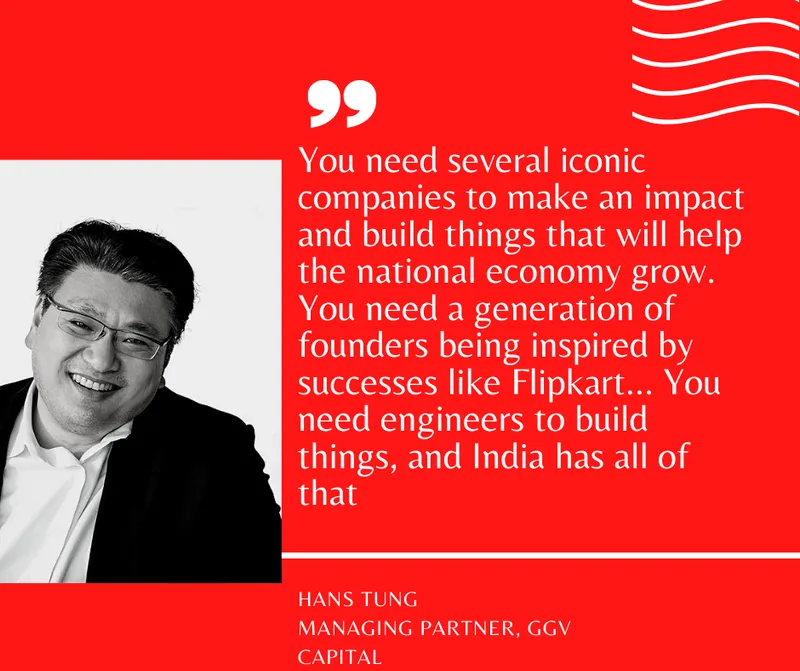GGV Capital’s Hans Tung on why the world is looking at the Indian startup ecosystem
From the sidelines of a YourStory event, Hans Tung, Managing Partner at GGV Capital, speaks about how grit and the drive to innovate stand Indian founders in good stead, how many startups survived COVID-19, and what struggling firms must focus on.
The quintessential Indian social conditioning of “failure is not an option” is visible even in the startup ecosystem. Indian startup founders are among the most versatile, resilient, intelligent, and hardworking people, and this attitude ensured the ecosystem was among the very few that swift-footedly weathered the downturn caused by the COVID-19 pandemic.
Indian startups kept swimming even when the tides were against them and, overall, the startup economy weathered the pandemic and even managed some landmark wins.
“It’s amazing to see Indian founders always wanting to learn, always thinking about how to innovate. When it comes to grit and intelligence, India is always ahead,” said Hans Tung, Managing Partner at , on the sidelines of a YourStory event.
With nearly 2.6 million STEM (science, technology, engineering and mathematics) students graduating every year, learning product building as part of the curriculum, and the Indian government throwing its weight behind the ecosystem to build locally but innovate for the world, Indian startups are fast becoming global leaders and trendsetters.
Using tech to improve ops
The tech sector, in particular, has grown by leaps and bounds. From virtually no internet connectivity back in 2005-2006 to becoming a forerunner in the SaaS space, Indian tech has come a long way — and it has carried the nation with it.
Jio, UPI, and GST have created and accelerated the creation of an online digital consumer class like never before, and traditionally offline sectors such as SMEs and MSMEs are getting online too, Hans says.
This leveraging of technology in India, which was especially expedited by the pandemic, has helped the country quickly scale new heights in terms of innovation, and, more importantly, efficiency, and investors are taking note of this.
“The pandemic definitely led to a mindset shift towards more processes, increased automation,” Hans said of the impact tech had on the SME/MSME sectors in India.
He added that the COVID-19 pandemic helped increase automation, and pushed companies towards online media usage to improve operations, explore newer avenues of sales, and even streamline sourcing and logistics.
Focus on positive unit economics
But for the companies that did not do so well, Hans suggested breaking away from the “growth at any cost” mindset, and, instead growing slowly to improve unit economics. Companies languishing in the aftermath of the COVID-19-induced lockdowns and a general slowdown in the economy should focus on positive unit economics, and aim to at least break even, if not turn a profit.
“Growth is important. Tt always has been but during this time having positive unit economics is extremely important for investors to have the confidence to put money in your startup,” he said.
“Focus on surviving first,” Hans said.
In his experience working with startups during the pandemic, Hans said he realised that founders who were able to cut costs, streamline operations, add more efficiency, and even innovate in the midst of it all were the ones that did very well and came out of the recession, unscathed.

Hans, via GGV Capital, has made more than 670 investments in startups around the world, raising a total of $7.8 billion across 19 funds. GGV’s portfolio includes B2B ecommerce startup Udaan, edtech venture Vedantu, and fintechs such as KhataBook and Rupeek.
The fund has also invested in notable US companies such as Airbnb, Coinbase, Peloton, Poshmark, Slack, and Square, among others.
Let technology be your guiding light
Think of all the ways in which technology, of any kind and form, has changed your life for the better. Our very social fabric is constantly evolving because of the influence of technology, and we’re today getting to a point where any business that is not leveraging technology already has lost the race before it could even begin.
All through the pandemic, in conversations with entrepreneurs, VCs, business leaders and industrialists, digitisation was one life vest that everyone advised donning, for businesses struggling, as well as those growing.
“We did see a lot of mom-and-pop businesses investing in and leveraging technology through the pandemic,” said Hans, sharing a unique perspective he garnered from his vantage point as a VC and an entrepreneur.
“A lot more automation is happening.. businesses are leveraging tech to improve and become more process-oriented and efficient. During the pandemic, you saw a lot more innovation on the product side. We also saw SaaS merging with marketplace companies, matching better sellers and buyers,” he added.
Tech-integrated sectors such as edtech, online communication, digital health, enterprise, and SaaS companies that enabled people to efficiently work from home, and wellness startups were some clear pandemic winners, thanks to the comfort they afforded people from the safety of their homes.
“The growth of the Indian tech sector over the last couple of years has been amazing,” said Hans, adding that the eyes of the world were now trained on India and what innovations come out next.
“You need several iconic companies to make an impact and build things that will help the national economy grow. You need a generation of founders being inspired by successes like Flipkart… You need engineers to build things, and India has all of that,” he said.
Indeed, with most of the economy’s troubles somewhat in the rear-view mirror, and hopes of a world safe from COVID-19 soon, this could be the Indian startup ecosystem’s moment in the sun.
Edited by Teja Lele



![[Podcast] Hans Tung on learnings from the Chinese startup ecosystem](https://images.yourstory.com/cs/2/eab8e5802d6a11e9aa979329348d4c3e/Image87fx1571375820262jpg?fm=png&auto=format&h=100&w=100&crop=entropy&fit=crop)




